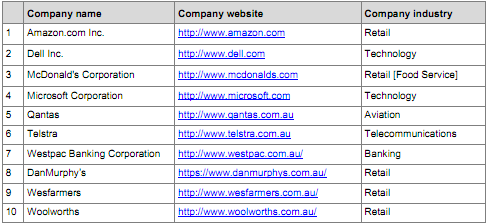Part -1:
Description: Working individually to evaluate the impact of globalisation on the value chain. Please see the following details:
While globalisation has been a major driver of industry economics for the last few decades, it does not explain all of the pressures and challenges facing companies in the early 21st century - general changes in industry structure and competition, the rapid rate of technological and cultural change, the need for environmental sustainability and changes in demographics have also had huge impacts. The growth in global sourcing and supply often levels the playing field for adding worldwide value.
Companies need at least to consider, if not implement, global value chains as their predominant mode of business. The reality of globalisation and the accompanying increase in competition has forced most companies into making efficient gains. Value chain structures are essentially virtual organisations with flexibility to meet changes in customer value expectation and in the way in which value is delivered.
Evaluate the impact of globalisation on the value chain based upon your own experience and the knowledge you gained from reading the required resources. Support and justify your evaluation of the impact of globalisation on the value chain by including information related to:
• competitive advantage considerations
• corporate social responsibility considerations
• cultural considerations
• financial considerations
• human resource considerations
• political and economic considerations
• technological considerations.
Part - 2
Description: Working in a group (3 or 4 students). You will prepare 20 minute presentation to present the findings of analysing a selected value chain (Background of case study company, demand chain analysis, value proposition, supply chain analysis, enterprise value and conclusion). Presentation slides are to be submitted with the coversheet before the scheduled presentation in the workshops. This assessment is designed to assess the students' ability to work in a dynamic group environment and cultivate their interpersonal communication and leadership capabilities.
Feedback: comments and a mark will be returned to you within one week of presentation.
Description: Working in the same group. You will prepare a report analysing a selected value chain (same as your group presentation company). You will identify and analyse the elements of the value chain and understand how they must interact to create value for the organisation. The details and the structure of the report are described as follows:
Customer-focused companies benefit from analysing their value chain as the process allows them to understand customer expectations, purchasing responses, product-service use, and accept that they are unlikely themselves to possess all of the resources to service customer needs.
When conducting a value chain analysis, customers and their characteristics are studied, and their needs and wants identified. These expectations form the basis for the demand chain. A supply chain design must be cost effective and respond to the expectations of the demand chain and the value proposition. Together, the demand chain and supply chain process and management comprise the value chain.
The purpose of this assessment is to identify and analyse elements of the value chain and understand how they must interact to create value for the organisation. The intent is to review the present, or relatively recent value chain of the company selected in the Week 2 value chain analysis discussion (see below).

Use the Walters and Rainbird textbook and at least ten (10) additional relevant and respected resources to support the value chain analysis. The following outline is based upon Figure 1.1 of the textbook. Value chain analysis
A. Demand chain analysis
� identification of customer, market, wants and needs
� market opportunity analysis
� identification and analysis of value drivers
B. Value proposition
� value proposition as related to demand chain
C. Supply chain analysis
• value production and coordination
• value delivery
• value servicing
D. Enterprise value
• Industry dirvers
• Competitive advantage
• Customer delight
E. Conclusion
F. References
Part -3
Description: You will require critical reflection on your experience in completing this subject. What major learning on managing the value chain can apply in practice as a manager in your organisation. Your learning experience of participating group project and discussions in the workshops, and issues you consider address in managing the value chain. The details are as followings:
Throughout your study in this subject you will have contributed to a range of group discussion, undertaken a range of activities and read and reflected on a number of readings.
Reflect on your experience in completing this subject. What major learnings on managing the value chain can you apply in practice as a manager in your organisation?
The list below provides some questions you may wish to consider in your critical reflection.
These are suggestions only.
You can address issues that are not in this list:
• Your view of managing the value chain before entering this subject and how this has, or hasn't changed.
• Has what you have learned in this subject created an increased awareness of the importance of managing the value chain? Explain your reasons.
• Your reflection on the group discussion activities and how these discussions have influenced your views and/or knowledge on managing the value chain. You may wish to use postings or comments from the forums to support your reflection.
• How you will use your learning from the subject in your workplace?
• Other aspects you have reflected on that are not included above.
You are encouraged to reflect earnestly about how the content in global economics has helped you achieve your goals.
Part -4: Group discussion participation in tutorial workshops
Description: You will require reading through the case studies and preparing for the discussion questions for each case study before attending the tutorial workshops.